LIXIL makes pioneering water and housing products that solve everyday, real-life challenges, making better homes a reality for everyone, everywhere.
- Global Site
-
- English
- Japanese
- Brand Sites
Global
- Global Site
-
- English
- Japanese
- Brand Sites
Environmental sections of our website are to be updated in August 2024

Progress in FYE2023
- CO2 emissions from Scope 1 and 2 (compared to FYE2019)
Reduced by - 29.9%
- Renewable energy ratio
- 25.0%
- Water use efficiency at our business sites
Improved by - 16.0%
- Waste recycling rate (across company)
- 88.1%

Situation on the Ground
The 2015 Paris Agreement pledged to limit the increase in the global average temperature to less than 1.5°C above pre-industrial levels. The subsequently adopted Glasgow Climate Pact clarified that the 1.5°C figure was no longer a target to be aimed for, but a de facto common goal. To achieve this, the world must reduce CO2 and other greenhouse gas emissions by 45% by 2030 (compared to 2010) and net zero by 2050. Nineteen percent of global energy-related CO2 emissions are from direct emissions by the building construction and materials industries, and another 18% are due to indirect emissions from buildings and homes in use*1.
Total household water use has increased six-fold since 1960 due to population growth and other factors*2. As of 2022, 2.2 billion people lack access to safely managed drinking water*3, and five billion people across the globe are expected to face water shortages by 2050*4.
Furthermore, the volume of natural resources extracted from the earth has tripled in the past 50 years and is expected to increase by another 60% by 2060*5. To help change this situation, the world is gradually shifting from a one-way economy, which mines new resources, makes products in large quantities, and eventually discards them, to a circular economy that closes resource loops.
*1 “Beyond foundations: Mainstreaming sustainable solutions to cut emissions from the buildings sector” by UNEP (A new page will open) >
*2 World Resource Institute (A new page will open) >
*3 “Progress on household drinking water, sanitation and hygiene 2000-2022” by UNICEF and WHO's Joint Monitoring Programme for Water Supply, Sanitation and Hygiene (A new page will open) >
*4 “2021 State of Climate Services: Water“ by WMO (A new page will open) >
*5 “Global Resources Outlook 2024“ by UNEP (A new page will open) >
Our Strategy
Material Issues
In order to realize LIXIL’s Purpose of “making better homes a reality for everyone, everywhere,” we have determined Water Conservation & Environmental Sustainability as one of the three pillars of our Impact Strategy and positioned the following six areas as priority material issues.
Climate Change Mitigation and Adaptation
Water Sustainability
Circular Economy
Environmental Impact of Product Lifecycle
Environmental Management
Conservation of Biodiversity
LIXIL Environmental Vision 2050
Compiled in FYE2020, the LIXIL Environmental Vision 2050 declared a commitment to ”Zero Carbon and Circular Living” and stipulated Climate Change Mitigation and Adaptation, Water Sustainability, and Circular Economy in the above material issues as focus areas for realizing the vision. As a springboard for promoting these focus areas, we have been striving to reduce our environmental burden across the product lifecycle and to strengthen our company-wide environmental management. LIXIL is also advancing initiatives to conserve biodiversity, serving as a common foundation for the three focus areas. By 2050, we aim to achieve net-zero carbon emissions and preserve water and natural resources in our operations, housing and lifestyle solutions for future generations as we seek to become a leading company in environmental sustainability.
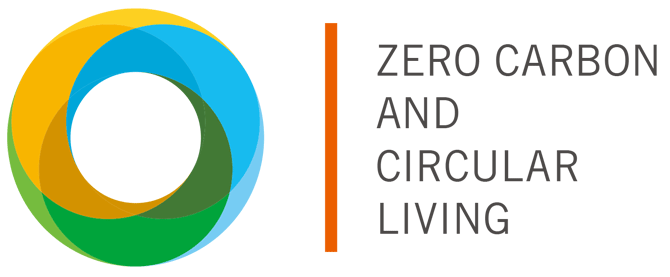
To realize the LIXIL Environmental Vision 2050, we are embedding our environmental strategy into our business as a key strategic initiative. This goes beyond simply fulfilling our corporate responsibility to minimize the environmental load of our business activities and products but delivering a greater impact on the global environment and society by creating new value in the environmental field with our stakeholders.
Three Focus Areas to Achieve Our Vision
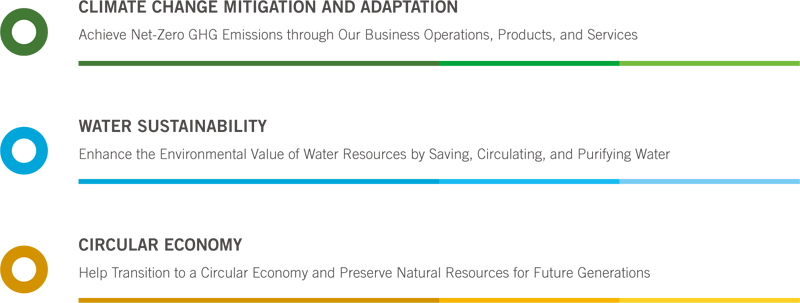
Three Focus Areas
Climate Change Mitigation and Adaptation
LIXIL seeks to achieve net-zero CO2 emissions by 2050 by both striving to reduce the environmental burden of our business processes and providing environmentally friendly products and services. Furthermore, we believe that it is important not only to reduce the CO2 emissions generated directly by LIXIL’s business processes, products, and services, but also to reduce CO2 emissions across our society as a whole.
LIXIL is transitioning towards the realization of a low-carbon society and has set long-term targets to reduce CO2 emissions to net zero by 2050. This long-term target became the first in the Japanese building materials industry to receive SBT Net Zero approval in March 2024.
SBT Net Zero approval >
We also promote ways to adapt to climate change by providing products and services to help mitigate the damage caused by climate change, such as higher rainfall, large-scale typhoons and other natural disasters, and rising temperatures.
Climate Change Mitigation and Adaption >
Water Sustainability
As a leading company in the water-related product industry, providing products such as toilets, kitchen systems, prefabricated bathrooms, and faucets, LIXIL strives to help achieve global water sustainability so that people can get the most out of the water they use.
To this aim, we promote responsible water usage by pursuing more efficient water use in our business processes, reducing water consumption particularly at sites where water resources are scarce, and helping reduce water use overall by offering water-saving products and services. We also work with governments and the broader public sector to improve access to safe and hygienic water, and use water purification technology in areas with access to tap water to provide even safer, more delicious water. These initiatives enable us to create environmental value for water.
Circular Economy
LIXIL uses a variety of resources, including metals, timber, resin, and ceramics. We promote company-wide initiatives to promote the sustainable use of raw materials and the recycling of resources across all stages of the product lifecycle, from procurement to manufacturing, product use and disposal. We pursue circular manufacturing based on the use of recycled materials and the designing of products to facilitate reuse. We are also pursuing initiatives based on the LIXIL Plastics Action Statement to reduce the amount of plastic used, recycle plastic, and develop alternative materials.
LIXIL Plastics Action Statement (A new page will open) PDF: 1.3MB >
Conservation of Biodiversity
From FYE2023, we expanded our material issues to include “Conservation of Biodiversity” to serve as the common foundation for our three focus areas in the environmental strategy and vital in ensuring LIXIL’s sustainable growth. The success of LIXIL’s business activities is reliant on water, minerals, and other resources (natural capital), while, at the same time, those business activities may affect climate change, resource depletion, water pollution, air pollution, and other issues. LIXIL understands its role in minimizing such effects and in mitigating the damage caused by floods and droughts resulting from such.
The world is experiencing an unprecedented, rapid loss of biodiversity, and. LIXIL is developing comprehensive measures to avoid and mitigate the negative effects of its business. To understand and identify its impact and dependencies on nature, LIXIL applies the LEAP approach recommended by the Taskforce on Nature-related Financial Disclosures (TNFD) including upstream activities in its value chain. We have also established policies for conserving biodiversity in our procurement in our Green Procurement Guidelines and sought the cooperation of our suppliers in this mission.
Defining Our Strategic Approach and Medium-Term Targets
We reviewed our strategy in FYE2023 to help further accelerate initiatives designed to achieve our Environmental Vision 2050. LIXIL aims not only to fulfill our social responsibilities, but also to create new value, and maximize the impact of our business. With that in mind, we have divided our three focus areas into three phases: Our Operation, Our Value Chain, and Expanding Our Impact, and have stipulated a comprehensive strategic approach and medium-term targets for each of these phases. We will steadily press ahead with various initiatives to maximize our positive impact in each phase in order to reduce environmental risk, seize business opportunities, and generate sustainable growth.
LIXIL Environmental Vision 2050 and Medium-Term Targets
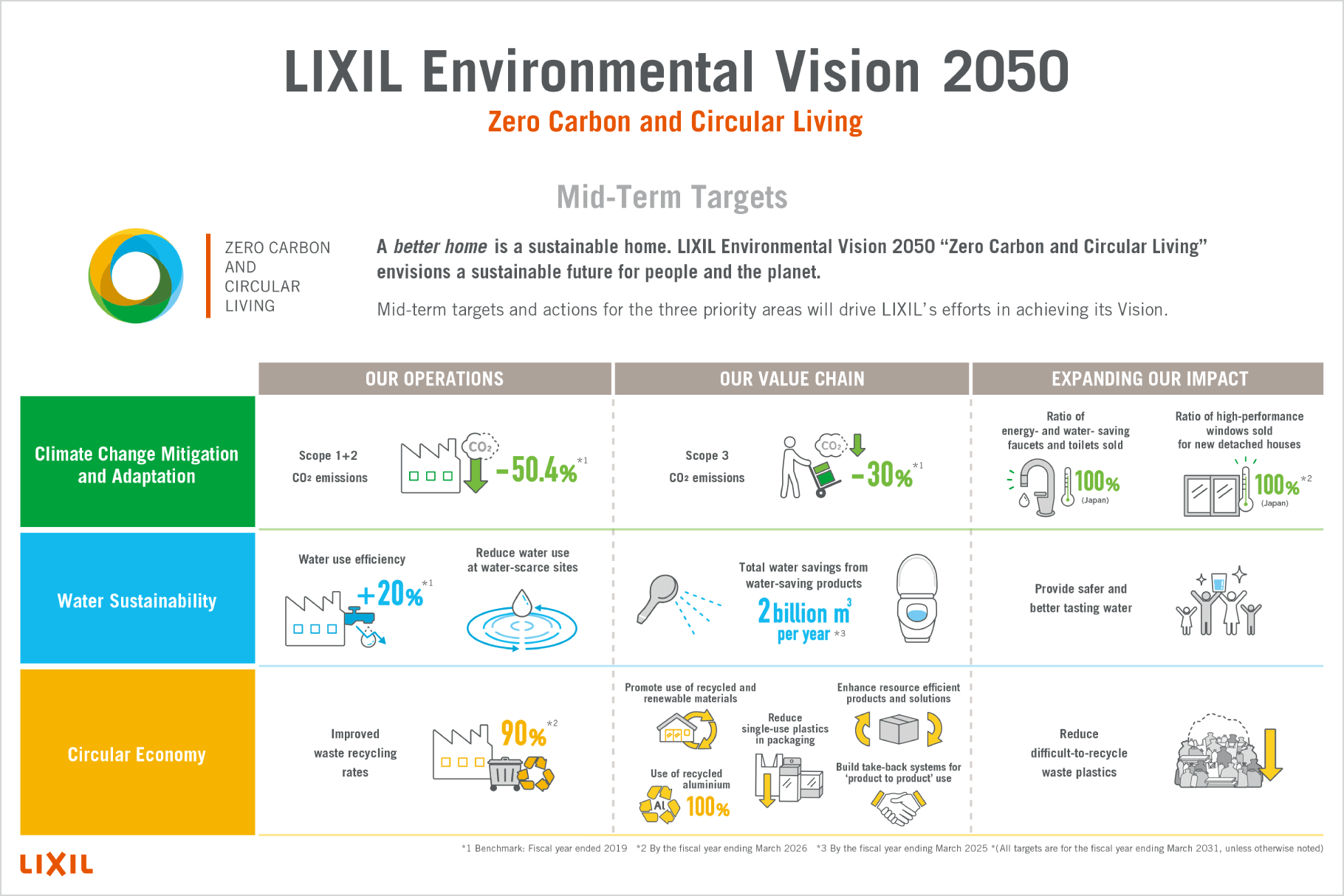
Three Phase Approach
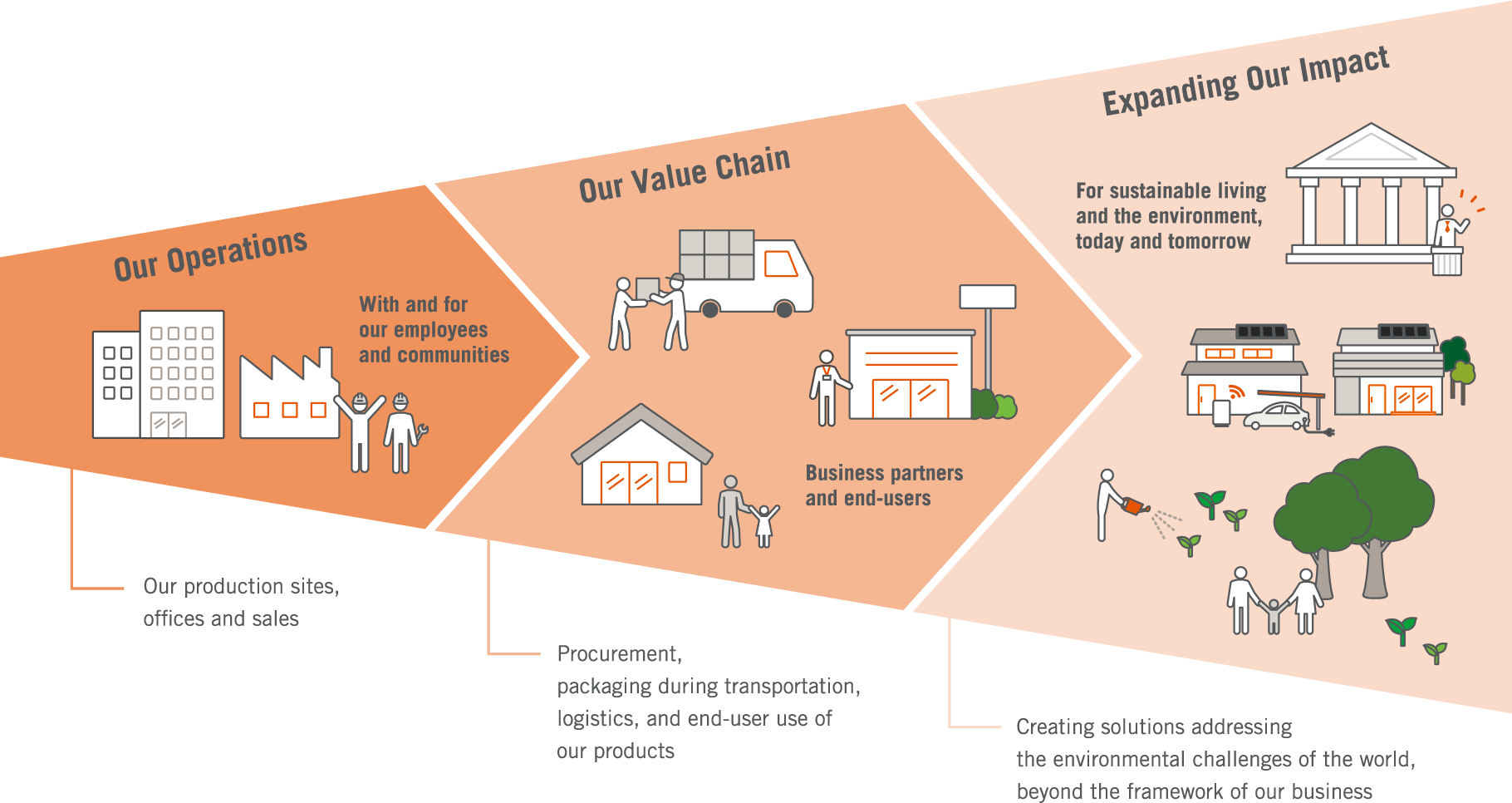
- Our Operations
Business processes at our production sites, offices, and sales bases, involving our employees and residents in the surrounding areas. - Our Value Chain
Processes generated through contact with external stakeholders across the whole value chain, from “activities relating to purchased goods and services, etc.,” which covers the mining of raw materials for products and the processing of those raw materials, to “activities relating to the sold products and services,” such as packaging for transportation, distribution, and product use by end users. Our major stakeholders are business partners and end users. - Expanding our Impact
This goes beyond production, user phase of our products in the value chain, and providing solutions that address the environmental challenges of the world. Identifying issues that contribute to the future of the planet that go beyond the framework of our existing business.
The targets and progress of each focus area are as follows:
| Focus Areas | Phases | Medium-Term Targets | Progress in FYE2023 |
|---|---|---|---|
| Climate Change Mitigation and Adaptation |
Our operations | 50.4% reduction on scope 1&2 CO2 emissions by FYE2031 (Baseline year FYE2019) | 29.9% reduction |
| Our value chain | 30% reduction on scope 3 CO2 emissions by FYE2031 (Baseline year FYE2019) | 15.2% reduction | |
| Expanding our impact | 100% ratio of number of energy- and water- saving faucets and toilets sold by FYE2031 (Japan) | Energy and water saving faucets 92.2%*1 Energy and water saving faucets and toilets 99.2%*2 |
|
| 100% ratio of number of high-performance windows sold for new detached houses by FYE2026 (Japan) | 90% | ||
| Water Sustainability |
Our operations | Improve water use efficiency by 20% in our operations by FYE2031 (Baseline year FYE2019) | 16.0% improvement |
| Reduce water use at water-scarce sites | Water Sustainability > Our Operations > Initiatives at sites with water risks | ||
| Our value chain | At the time of FYE2025, 2 billion m3 of total water saved by spreading water-saving faucets and toilets | 1.5 billion m3 | |
| Expanding our impact | Provide safer and better-tasting water | Water Sustainability > Expanding our impact | |
| Circular Economy | Our operations | Improve waste recycling rate to 90% in our operations by FYE2026 | Across company 88.1% Japan 97.3% Europe 99.0% Asia (excluding Japan) 96.8% North America 69.0% |
| Our value chain | 100% of recycled aluminum used in our aluminum extrusion by FYE2031 | 74%*3 | |
| Increase the ratio of recycled and renewable materials used in our products | Circular Economy > Our Value Chain > Minimizing use of new resources | ||
| Eliminate packaging materials made of petroleum-based plastics to be discarded by end users and replace them with marine degradable materials | Circular Economy > Our Value Chain > Minimizing use of new resources | ||
| Enhance resource-efficient products and solutions | Circular Economy > Our Value Chain > Offering more resource-efficient products | ||
| Build systems that take back our products and recycle them into new products | Circular Economy > Our Value Chain > Creating a circular economy for products | ||
| Expanding our impact | Reduce difficult-to-recycle waste plastics by developing innovative materials | Circular Economy > Expanding our impact |
*1 Excluding products used for hot tub filling or full-body bathing that are not intended for use as energy- and water-saving faucets
*2 Excluding products designed for housing complexes
*3 Aluminum alloy 6063
Please refer to the following items for more details about each focus area.
Climate Change Mitigation and Adaptation >
Water Sustainability >
Circular Economy >
Environmental Management
We are strengthening company-wide management to reduce environmental risks that we seek to address in the LIXIL Environmental Vision 2050 and expand the environmental benefits that we offer to society.
Our System
LIXIL has established a governance system in which the Board of Directors oversees the entire sustainability initiatives. We have also established an Environmental Strategy Committee (ESC), chaired by the Chief Environmental Impact Officer (CEIO) who is appointed by the Board of Executive Officers. At the regular meetings of the ESC, which are held at least once every three months, we formulate and implement environmental strategies, including determining rules and policies relating to environmental governance, deliberating and deciding measures to address risks and opportunities due to climate change and other environmental issues, and managing and monitoring company-wide environmental targets.
The results of ESC discussions and resolutions are reported to the Board of Executive Officers quarterly through the Impact Strategy Committee. The Board of Executive Officers discusses and approves targets and action plans on environmental issues and other significant matters. The progress is elevated to the Board of Directors twice a year for discussion and oversight. Matters related to climate change and other environmental issues are also reported to and discussed at the Governance Committee. Thus, we regard responding to climate change as an important issue.
In FYE2023, the ESC discussed and decided to review our overall strategy, which included the formulation of medium-term targets for pursuing water sustainability and circular economy and the establishment of a comprehensive approach for realizing our Environmental Vision 2050. At the same time, the conservation of biodiversity was added to our list of material issues as the foundation for the three focus areas and as a key issue that needs to be addressed to ensure LIXIL’s sustainable growth.
Environmental management structure
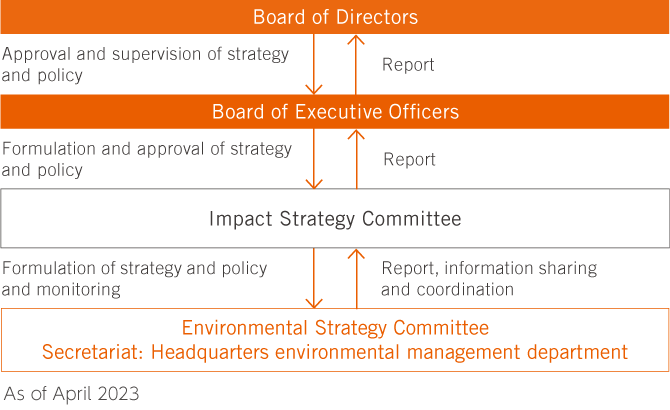
LIXIL Environmental Sustainability Principles
Striving to help people live in harmony with the earth, LIXIL is committed to continuing our environmentally sound efforts in every aspect of our business activities. To that aim, LIXIL formulated the LIXIL Environmental Sustainability Principles that apply to all employees and all company officers, including directors and executive officers.
- Continually improve environmental management systems and performance
- Adhere to rigorous compliance
- Develop and provide environmentally friendly products and services
- Reduce environmental impact in every process of the business operation
- Promote stakeholder engagement
LIXIL Environmental Sustainability Principles (A new page will open) PDF: 189KB >
Environmental Auditing
Internal Auditing
We also have an internal environmental auditing system that covers all our production bases as well as nonproduction bases and group companies in Japan. We conduct internal audits at production bases based on ISO 14001 to check that environmental management systems are effective and law-abiding. We also manage hazardous waste and air pollutants using a management system based on ISO 14001. At non-production bases and group companies, we conduct internal audits according to our own ISO-based environmental management systems and are gradually expanding the number of companies covered. We follow up on any matters highlighted by the internal audits and confirm that improvements are being implemented to ensure the effective operation of our management systems.
Our headquarters environmental management department have been auditing the environment managers at individual business units since FYE2018.
Acquiring ISO 14001 Certification
We are working hard to achieve ISO 14001 certification at targeted production sites in order to strengthen environmental governance at all relevant locations including group companies. In FYE2023, 94.7% of targeted sites were certified.
ISO 14001-Certified Sites (FYE2023)
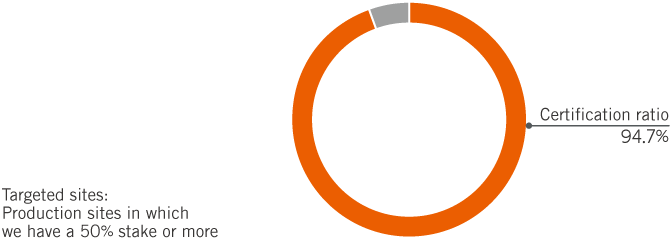
List of ISO-certified sites (A new page will open) PDF: 160KB >
Environmental Education
We strive to inform and educate all our employees about environmental initiatives. In addition to conducting environmental training for new recruits, we distribute environmental education content via e-learning channels each year in June and provide Environmental Management System (EMS) training for EMS promotion managers and operators at each site. In FYE2023, we started sharing the monthly reports on environmental trends that were previously exclusive to top management, including the directors and executive officers, with all employees on our internal social media. Also in FYE2023, we invited external experts to conduct seminars on "LIXIL’s role in achieving a carbon-neutral society" and "Reducing Scope 3 emissions."
Internal Evaluation
Regarding the compensation system for executive officers, we have introduced stock-linked compensation that helps encourage their contribution to improving the company’s medium- to long-term corporate value, including environmental, social and governance (ESG) factors. For officers who are expected to improve the company’s value over the medium- to long-term, including from an ESG perspective, the ratio of stock-linked compensation to total compensation is set higher based on the deliberation of the Compensation Committee.
We hold our annual LIXIL AWARDS to recognize and celebrate employees’ incredible and exemplary work in line with the strategic initiatives of our LIXIL Playbook. This program applies to all our employees. The LIXIL AWARDS held in June 2023 recognized 794 projects, with 4,200 winners receiving a cash reward. Among the projects awarded, some included an environmental dimension such as reducing CO2 emissions, improving energy efficiency, or performing practical investigations to implement more environmental production processes. Separately, we hold award campaigns in our technology departments in Japan to recognize business sites and units that contribute to addressing environmental issues. Every year awards go to activities that reduce environmental burden at production sites in pursuit of the LIXIL Environmental Vision, and initiatives that promote the development of products and services to help address environmental issues.
Reducing Environmental Impact of Product Lifecycle
LIXIL boasts operations in over 150 countries, and more than one billion people use LIXIL products every day. It is essential to reduce the burden on the environment across the product lifecycle, from raw materials procurement through manufacturing, use, and disposal, in order to proactively conserve the global environment.
We are working hard to reduce the environmental burden of the product lifecycle, positioning it as one of our material issues. We are implementing initiatives as part of our company-wide environmental activities driven by our Environmental Strategy Committee.
Environmentally Conscious Design
Product-Related Environmental Assessment
In Japan, we conduct an environmental assessment at each stage of the product development process to ensure compliance with environmental laws, and to help reduce the environmental burden of products in all three lifecycle stages: produce, use, and dispose.
Product-Related Environmental Assessment Steps
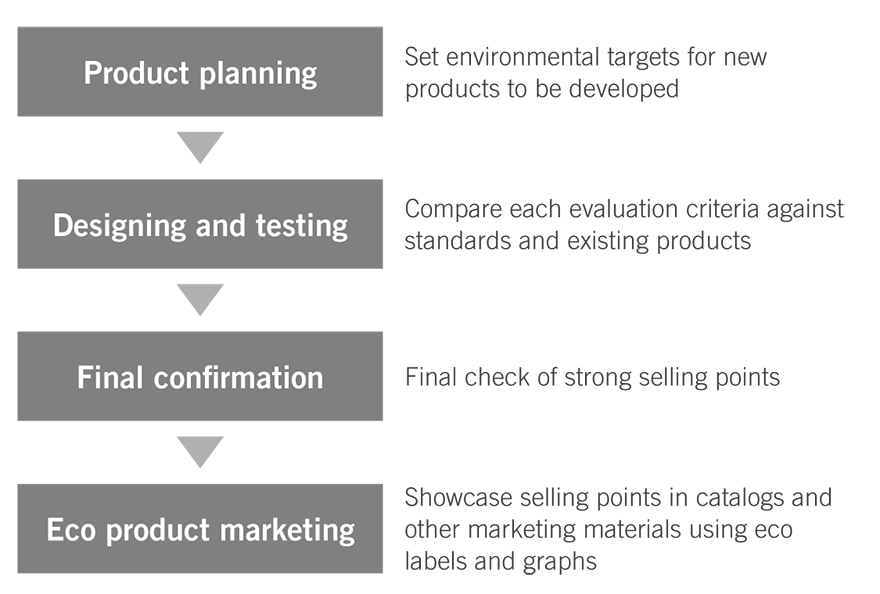
Evaluation Criteria for Product-Related Environmental Assessment
| Stage | Items to be considered | Eco product features |
|---|---|---|
| Produce | Reducing major component materials and parts | Resource-saving |
| Additional reductions from using recycled materials | Recycled material use | |
| Efficient assembly and construction | Construction-saving | |
| Using lawful, sustainable wooden materials | Lawfully logged wood | |
| Use | Reducing energy and water usage in everyday living | Energy-and water-saving |
| Improving performance using natural energy and zero energy use | Energy-creating, zero energy | |
| Ease of maintenance and cleaning | Dirt-proofing, easy cleaning | |
| Responding to sick-house countermeasures | F☆☆☆☆, etc.* | |
| Dispose | Material recyclability of main component materials and parts | Recyclable design |
| Reusability of main component materials and parts | Reusable |
* F☆☆☆☆ (four-star) is the highest rating in the formaldehyde emissions level rating scheme.
Acquiring EPD in Each Region
An Environmental Product Declaration (EPD) is a third-party verified report issued following a quantitative calculation of environment impact (CO2 emissions, etc.) during a product lifecycle based on ISO 14025 – Type III Environmental Declarations. LIXIL is working to obtain EPD certification in each region to serve as third-party verification of life cycle assessment (LCA) results that quantify environmental impact through accumulated inputs and outputs across the product lifecycle from the procurement of raw materials through the manufacturing, use, and disposal of a product.
In Europe, the calculation of CO2 emissions for buildings is becoming increasingly regulated. In FYE2023, the GROHE brand acquired International EPD certification for 18 groups of products (including 774 SKUs). In Japan, we acquired the EcoLeaf environmental label for two sash windows for buildings and our PremiAL series of low-carbon aluminum profiles. LIXIL currently has a total of 56 EPDs for GROHE, American Standard, and LIXIL branded products (as of May 2023).
Management of Chemical Substances
Across all of our business processes, LIXIL has been seeking to appropriately manage chemicals and reduce substances of concern that can affect human health and environment, helping to resolve environmental pollution issues and improve people’s comfort and lifestyles.
Management of Chemical Substances (A new page will open) PDF: 304KB >
In Japan, LIXIL’s corporate functions of Environment, Procurement, and Quality partner with our technology businesses under the direction of the Chief Environmental Impact Officer to encourage appropriate management and operation of chemical substances in products. We have also established chemical substance management systems at bases and business in countries outside Japan and are pursuing relevant initiatives. We are striving to develop a solid management platform and to further strengthen governance, which will help maintain and improve compliance.
Managing Chemicals in Operational Processes
LIXIL strives to appropriately manage any chemical substances contained in our products based on the laws and regulations of each market in which we operate (EU RoHS Directive, REACH Regulation, etc.) and our own guidelines. In Japan, we take action together with the procurement department based on the LIXIL Chemical Substances Management Rank Guidelines that stipulate which substances are not allowed to be included in products and how to control and handle substances that are permitted. Our suppliers are required to collect information that proves the non-use of chemical substances that are not permitted and the content of chemical substances contained in products as stipulated by the guidelines. We collect information on legal and regulatory trends both inside and outside Japan on a regular basis and revise the guidelines when required. We also convey the latest legal and regulatory developments to the relevant departments to promote deeper understanding.
In Japan, we have introduced a dedicated management system for chemical substances in order to appropriately manage information when collecting details on chemicals in products from our suppliers, gathering internal data, and providing information to customers.
LIXIL’s Chemical Substances Management Rank Guidelines (A new page will open) PDF: 713KB >
Chemical Substance Management Process
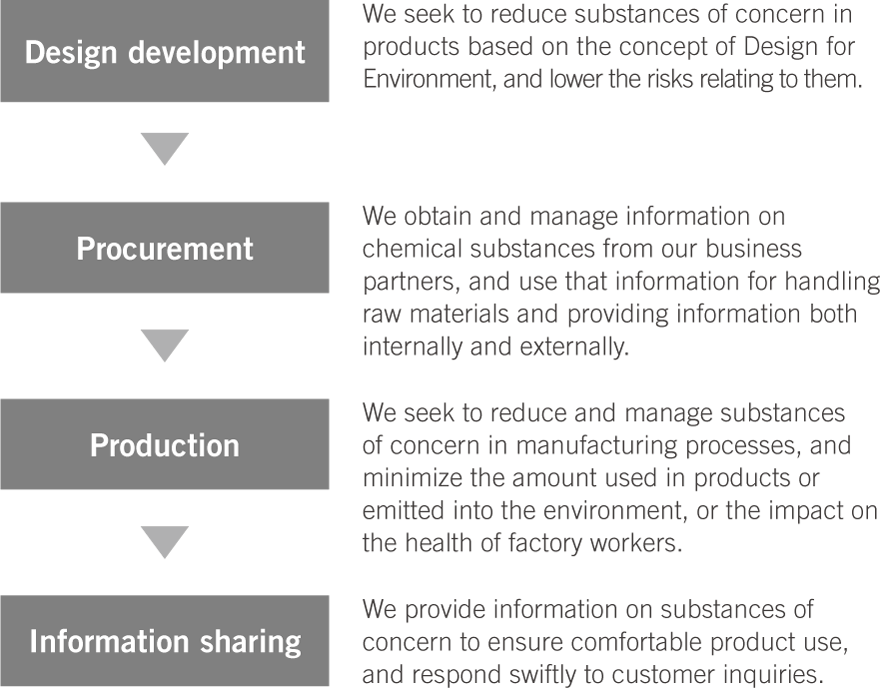
Chemical Substance Database
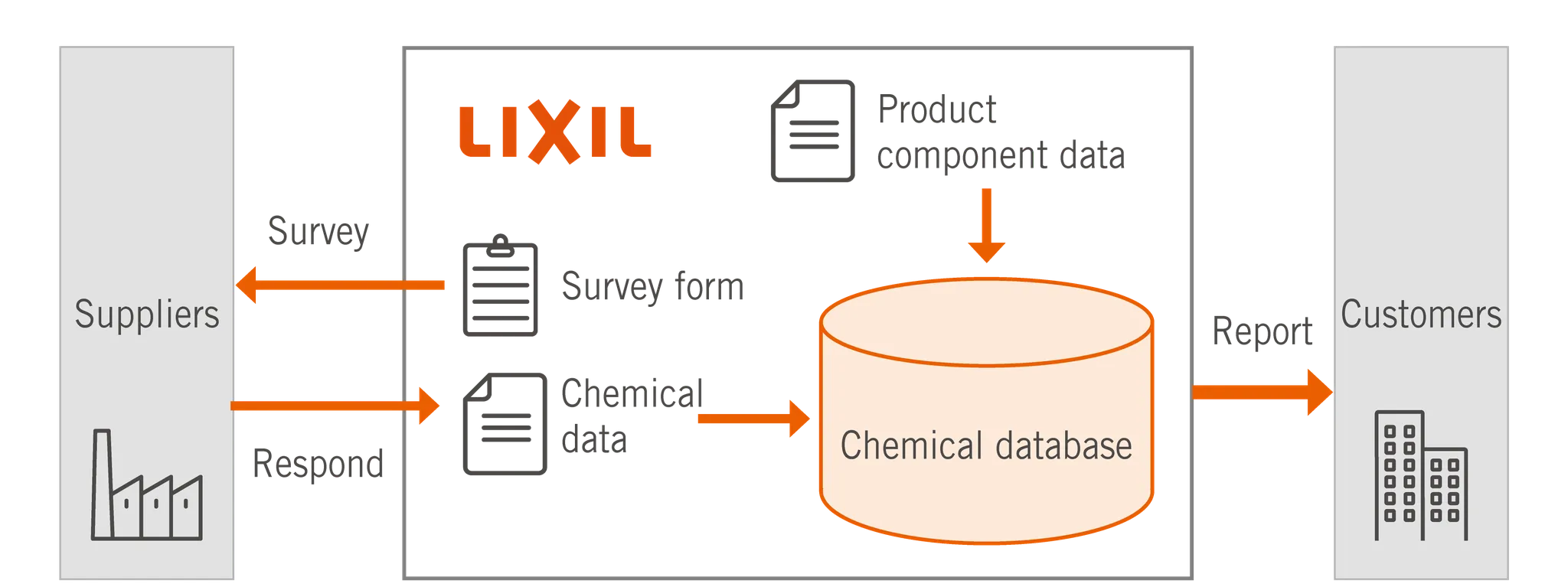
GROHE publishes the GROHE Sustainability Position Paper on its website and also discloses it to customers and other stakeholders. The paper is designed to serve as proof of compliance with legal standards for substances that are not permitted to be included in products or which require special management.
Reducing Substances of Concern
In new product development, we prioritize the reduction of substances of concern in our products to meet strong societal demands. We also collaborate with our suppliers to find alternatives to any substances of concern in our existing products.
Environmental Communication
To stay true to our commitment to combatting climate change and other environmental issues, LIXIL continuously engages in public policy advocacy and discloses information to stakeholders by participating in related initiatives, and industry and business associations inside and outside Japan.
Participating in Japan domestic and international Initiatives
LIXIL is committed to environmental conservation and assertively representing the industry sector and its challenges through advocacy in Japan domestic and international initiatives.
| Initiatives | Overview and LIXIL’s participation |
|---|---|
| Task Force on Climate-related Financial Disclosures (TCFD) | An initiative that seeks to promote the disclosure of information relating to climate change risks and opportunities. LIXIL announced our endorsement in March 2019. Task Force on Climate-related Financial Disclosures (TCFD) (A new page will open) > Response to the TCFD and TNFD Recommendations > |
| The Taskforce on Nature-related Financial Disclosures (TNFD) | An initiative that promotes disclosure of information on risks and opportunities related to factors such as natural capital and biodiversity. LIXIL endorsed the TNFD Recommendations announced in September 2023 (ver. 01), and in December we participated in the TNFD Forum*1 We also registered as a TNFD Early Adopter*2 in January 2024, expressing our intent to start implementing Recommendations in FYE2024 for disclosure in FYE2025. The Taskforce on Nature-related Financial Disclosures (TNFD) (A new page will open) > Response to the TCFD and TNFD Recommendations > |
| Science Based Targets initiative (SBTi) | Science Based Targets initiative (SBTi) is a global initiative to define and promote companies’ best practices in emissions reduction and net-zero targets that meet the Paris Agreement goals. In March 2023, LIXIL renewed its verification from SBTi for its near-term 2030 CO2 emission reduction targets are in line with SBTi’s latest targets to keep the global temperature increase to below 1.5°C compared to pre-industrial temperatures. In March 2024, LIXIL’s long-term target to achieve net-zero CO2 emissions by 2050 was also approved by the SBTi to be 1.5℃-aligned. Science Based Targets initiative (SBTi) (A new page will open) > |
| RE100 | An international corporate initiative that seeks to achieve 100% renewable electricity in business activities. LIXIL joined in October 2019. RE100 (A new page will open) > |
| Japan Climate Leaders’ Partnership (JCLP) | A group of Japanese companies aiming to create a sustainable decarbonized society. The group implements management strategies, fosters corporate cooperation, and makes recommendations to the Japanese government to achieve it. LIXIL has participated since September 2014. Japan Climate Leaders’ Partnership (JCLP) (A new page will open) > |
| Japan Climate Initiative (JCI) | A network of companies, local governments, NGOs, and other private members that aims to realize a decarbonized society. LIXIL has participated since July 2018. In April 2023, we expressed our support for a message calling on the government to accelerate the introduction of renewable energy and prompted the introduction of effective carbon pricing. Japan Climate Initiative (JCI) (A new page will open) > |
| GX League | A forum led by Japan’s Ministry of Economy, Trade and Industry (METI), aims to form public-private partnerships to discuss introducing policies or rules for carbon neutrality by 2050. LIXIL has participated since March 2022. We are also involved in the GX League’s working group, which aims to establish a system for appropriately evaluating the contributions of Japanese companies in addressing climate change through discussions in the public and private sectors from the rule design stage. GX League (Japanese only, a new page will open) > |
*1 A network of stakeholders that contribute to TNFD guidance development
*2 Companies and organizations that intend to start making disclosures aligned with the TNFD Recommendations in FYE2024 or 2025, and have registered on the TNFD website
Environmental Disclosure
We promote transparency and timely to develop and maintain the trust of our stakeholders.
| Disclosure Framework | Overview and LIXIL’s participation |
|---|---|
CDP Disclosure and Rating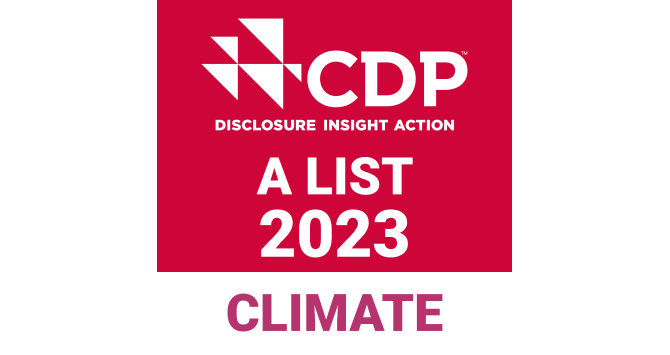 |
・We are promoting the disclosure of detailed information relating to our environmental activities through responses to the Carbon Disclosure Project (CDP), a global leader in environmental reporting surveys. ・LIXIL earned its place on CDP’s Climate Change A List of top-rated companies for the first time, and was rated B for CDP Water Security 2023. CDP ratings 2023 > |
Information Disclosure Based on TCFD and TNFD Recommendations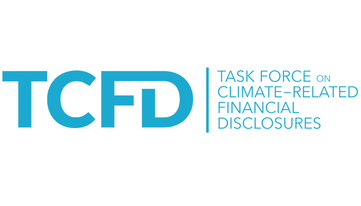 |
・In March 2019, we announced our endorsement of TCFD and have since been promoting information disclosure based on TCFD recommendations. ・In FYE2020, we conducted a scenario analysis of climate-related risks and opportunities in line with the TCFD recommendations for a portion of our business under a support program by Japan’s Ministry of the Environment. In FYE2022, we further expanded the range of target businesses, conducted a risk and opportunity analysis, and formulated ambitious targets for reducing CO2 emissions. In June 2022, we created a designated webpage to disclose more detailed accounts of the analysis and countermeasures, and have updated the information in June 2023. Please refer to the following items for more details. ・In June 2024, we published a report based on TCFD and TNFD recommendations including disclosures on climate change, natural capital, and biodiversity Environmental data > Response to the TCFD and TNFD Recommendations > |
